BusinessEurope Headlines No. 2019-23
European Steel Day: More proactive and assertive industrial strategy needed to tackle challenges
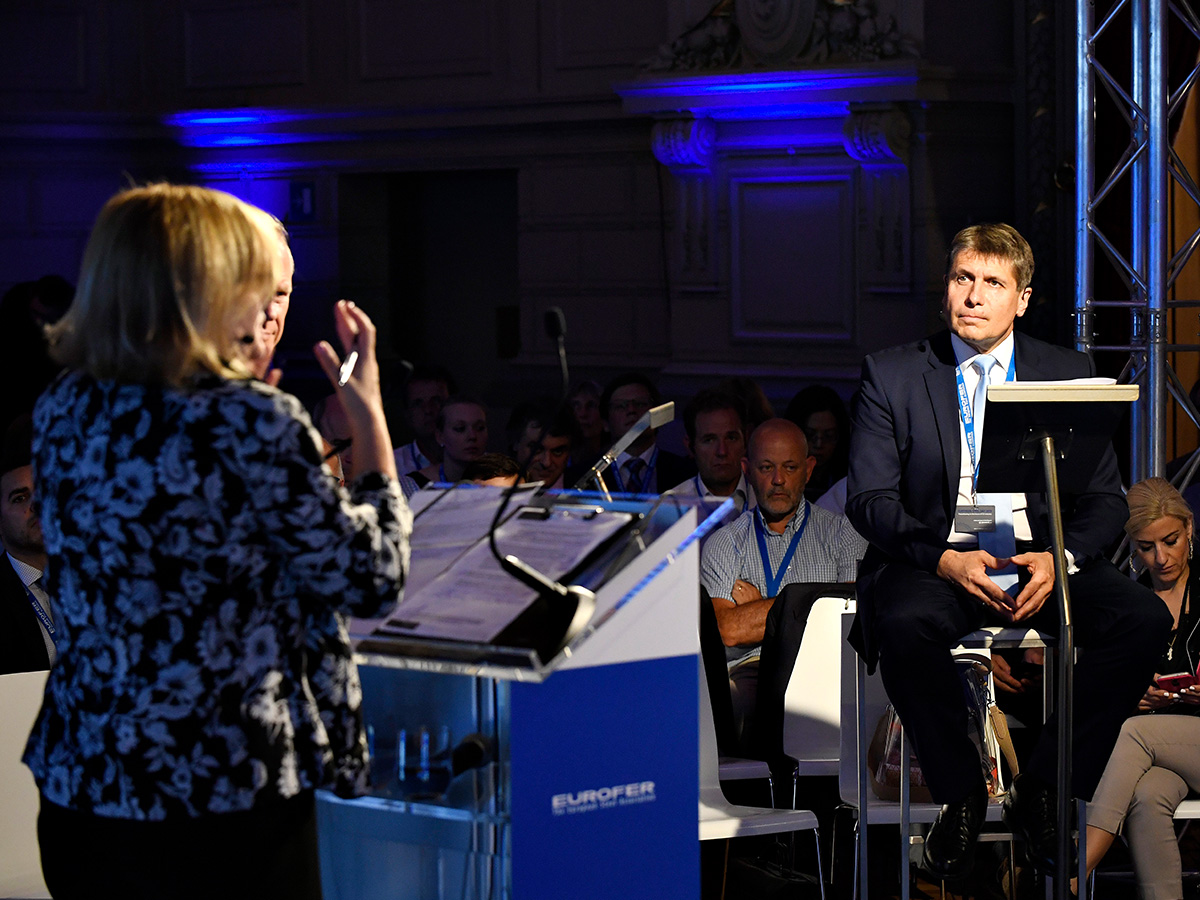
“Europe needs a more strategic approach on industrial policy”, said Markus J. Beyrer, BusinessEurope Director General, to an audience of more than 300 guests at the European Steel Day on 26 June 2019 in Brussels at the panel on “The state of EU industry: transition in an era of geopolitical, economic and environmental challenges”. A clear message from the panel was that the growing trade tensions and subsidised global overcapacities put the steel sector under pressure. In reaction to this, Beyrer made clear that the way forward is to ensure that EU industry is strong enough to face foreign competition while restoring a level playing field. Therefore, the EU should focus on innovation and on defining rules to effectively address distorting state subsidies in the context of a reformed and effective World Trade Organisation (WTO). Reacting on the sometimes aggressive strategies based on unfair trade practices by the USA and China, Beyrer made clear: “Europe does not have to follow these models, but needs to be more proactive and more assertive to be competitive and tackle the upcoming challenges.”
Contact: Asdin El Habassi
Photo copyright: Eurofer
Video message on the EU social policy
Europe is one of the best places in the world to live and work. So why do we need a step change in social policy? Watch our experts commenting on this topic. We also invite you to read our position paper.
Video message on investment climate in Africa
The Minister of Foreign Affairs of Ivory Coast, Marcel Amon-Tanoh, speaks about the crucial reforms made in the country to attract more investments and why European businesses should be investing in Africa. See also our paper on investment climate in Africa.
Meeting the new Director General for Trade Sabine Weyand
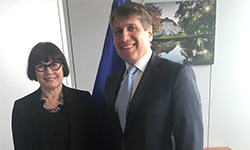 The current European Commission’s term is almost over but many important trade files remain active. The negotiations with Mercosur are at crunch time and this could be the last opportunity to conclude what we have started more than 20 years ago. “Mercosur is a market of 260 million consumers that has remained closed due to high tariffs and a number of other non-tariff barriers. We can be the first of Mercosur’s major trading partners to benefit from preferential access and give our companies a first mover advantage. We expect both sides are committed to deliver an ambitious and balanced outcome”, said Markus J. Beyrer, BusinessEurope Director General. The EU-US relations were also high on the agenda without forgetting China and the World Trade Organisation (WTO). Beyrer stated that European business supports the Commission’s efforts to maintain a positive agenda with the USA and the negotiations on industrial tariffs and conformity assessment. At the same time, we are extremely concerned by the possibility of additional tariffs on cars and other products as a result of the Airbus/Boeing case and we still face additional duties on steel and aluminium. “We should be addressing market distortions and other global trading problems by working together, not against each other. The international trading system is under pressure and it is in the interest of all who have benefited from the system to engage and contribute to its reform, including China and the USA”, he concluded.
The current European Commission’s term is almost over but many important trade files remain active. The negotiations with Mercosur are at crunch time and this could be the last opportunity to conclude what we have started more than 20 years ago. “Mercosur is a market of 260 million consumers that has remained closed due to high tariffs and a number of other non-tariff barriers. We can be the first of Mercosur’s major trading partners to benefit from preferential access and give our companies a first mover advantage. We expect both sides are committed to deliver an ambitious and balanced outcome”, said Markus J. Beyrer, BusinessEurope Director General. The EU-US relations were also high on the agenda without forgetting China and the World Trade Organisation (WTO). Beyrer stated that European business supports the Commission’s efforts to maintain a positive agenda with the USA and the negotiations on industrial tariffs and conformity assessment. At the same time, we are extremely concerned by the possibility of additional tariffs on cars and other products as a result of the Airbus/Boeing case and we still face additional duties on steel and aluminium. “We should be addressing market distortions and other global trading problems by working together, not against each other. The international trading system is under pressure and it is in the interest of all who have benefited from the system to engage and contribute to its reform, including China and the USA”, he concluded.
Contact: Luisa Santos
Strengthening ties with the Australian business community
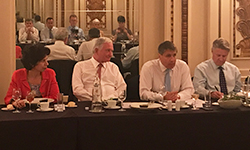 On 26 June, BusinessEurope met with a large delegation of the European Australian Business Council on the occasion of their visit to Brussels, led by Chairman Philip Aiken and CEO Jason Collins. The Australian Ambassador to the EU, Justin Brown, and the EU Ambassador to Australia, Michael Pulch, were also in attendance. “The European business community is strongly committed to reaching a successful conclusion of the ongoing bilateral trade negotiations” said Markus J. Beyrer, BusinessEurope Director General. In late July, it will be BusinessEurope’s turn to visit Australia. “The main objective of the mission is to show our engagement and our confidence that the final agreement will be ambitious and beneficial for business, workers and consumers in the EU as well as in Australia”, Beyrer added.
On 26 June, BusinessEurope met with a large delegation of the European Australian Business Council on the occasion of their visit to Brussels, led by Chairman Philip Aiken and CEO Jason Collins. The Australian Ambassador to the EU, Justin Brown, and the EU Ambassador to Australia, Michael Pulch, were also in attendance. “The European business community is strongly committed to reaching a successful conclusion of the ongoing bilateral trade negotiations” said Markus J. Beyrer, BusinessEurope Director General. In late July, it will be BusinessEurope’s turn to visit Australia. “The main objective of the mission is to show our engagement and our confidence that the final agreement will be ambitious and beneficial for business, workers and consumers in the EU as well as in Australia”, Beyrer added.
Contact: Eleonora Catella
Social partners launch joint work on skills training and innovation
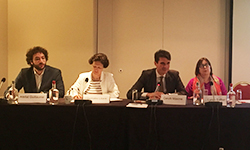 Skills, innovation and training are key issues that will help Europe to prosper in the face of competition from its global competitors. Social partners play a central role in finding solutions that will not only address skills needs through reskilling and upskilling, but also in using those skills to foster innovation, all of which will contribute to strengthening Europe’s industrial policy. These were the key messages given by Maxime Cerutti, BusinessEurope Director for Social Affairs, at a European social partners fact-finding seminar that took place on 26 June in the run up to a research project to be undertaken in 2020-2021.
Skills, innovation and training are key issues that will help Europe to prosper in the face of competition from its global competitors. Social partners play a central role in finding solutions that will not only address skills needs through reskilling and upskilling, but also in using those skills to foster innovation, all of which will contribute to strengthening Europe’s industrial policy. These were the key messages given by Maxime Cerutti, BusinessEurope Director for Social Affairs, at a European social partners fact-finding seminar that took place on 26 June in the run up to a research project to be undertaken in 2020-2021.
Contact Robert Plummer
Single Market Forum: delivering on promises still a challenge
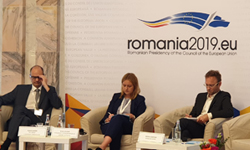 The biggest annual Single Market event - the Single Market Forum – took place in Bucharest last Friday, 21 June. Stakeholders discussed the Single Market issues to be addressed in the coming years with the European Commission, European Parliament, Member States’ national, regional and local government representatives. The Forum addressed issues in relation to digitalisation of the economy and society at large and the Single Market role. A series of stakeholder workshops was focusing on the areas of freedom to provide services and public procurement. On the panel on the services agenda for the future, BusinessEurope Director for Internal Market Martynas Barysas underlined the need for much stronger focus on transparent and uniform implementation and enforcement of the Single Market rules as a basis, referring both to the old remaining issues with implementation of the Services Directive and new challenges of uniform application of the General Data Protection Regulation that affects service provision. On top of that, further integration should be sought to benefit from all efficiency and productivity potential in services, focusing on the areas of great importance to industry. “Industrial value chains are also hit by underperforming Single Market for services in EU”, Barysas highlighted, and hinted that removal of barriers in business services (such as logistics or digital) should be on the agenda. “It is interesting how the new EU strategic agenda will be actually delivered”, he added, recalling that the EU leaders stressed the EU could not afford to under-utilise the potential of a market of half a billion people, particularly in the area of services. Short-term difficulties cannot be invoked as an argument against a long-term strategy, the leaders claim, and the delivery – read implementation – is yet again likely to be the most important word in the coming years. The European Commission should make the key highlights from the Forum available in the coming days.
The biggest annual Single Market event - the Single Market Forum – took place in Bucharest last Friday, 21 June. Stakeholders discussed the Single Market issues to be addressed in the coming years with the European Commission, European Parliament, Member States’ national, regional and local government representatives. The Forum addressed issues in relation to digitalisation of the economy and society at large and the Single Market role. A series of stakeholder workshops was focusing on the areas of freedom to provide services and public procurement. On the panel on the services agenda for the future, BusinessEurope Director for Internal Market Martynas Barysas underlined the need for much stronger focus on transparent and uniform implementation and enforcement of the Single Market rules as a basis, referring both to the old remaining issues with implementation of the Services Directive and new challenges of uniform application of the General Data Protection Regulation that affects service provision. On top of that, further integration should be sought to benefit from all efficiency and productivity potential in services, focusing on the areas of great importance to industry. “Industrial value chains are also hit by underperforming Single Market for services in EU”, Barysas highlighted, and hinted that removal of barriers in business services (such as logistics or digital) should be on the agenda. “It is interesting how the new EU strategic agenda will be actually delivered”, he added, recalling that the EU leaders stressed the EU could not afford to under-utilise the potential of a market of half a billion people, particularly in the area of services. Short-term difficulties cannot be invoked as an argument against a long-term strategy, the leaders claim, and the delivery – read implementation – is yet again likely to be the most important word in the coming years. The European Commission should make the key highlights from the Forum available in the coming days.
Contact: Martynas Barysas
SME policy must be at the centre of the next EU Commission
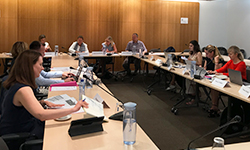 As a new European Commission will take office in a few months, BusinessEurope Entrepreneurship and SME Committee met to assess where the EU SME policy is standing today and define what to expect from the future. Exchanging views with Kristin Schreiber, Director at the European Commission Directorate-General for Internal Market, Industry, Entrepreneurship and SMEs (DG GROW), who joined their meeting, the Chair of BusinessEurope’s Entrepreneurship and SME Committee Anna-Lena Bohm stressed that “it is crucial that in the next years the Commission focuses on those areas which are vital for European SMEs, by looking at new developments and challenges in view of updating the Small Business Act, continuing efforts to further deepen and strengthen the Single Market and designing EU programmes which support SMEs”.
As a new European Commission will take office in a few months, BusinessEurope Entrepreneurship and SME Committee met to assess where the EU SME policy is standing today and define what to expect from the future. Exchanging views with Kristin Schreiber, Director at the European Commission Directorate-General for Internal Market, Industry, Entrepreneurship and SMEs (DG GROW), who joined their meeting, the Chair of BusinessEurope’s Entrepreneurship and SME Committee Anna-Lena Bohm stressed that “it is crucial that in the next years the Commission focuses on those areas which are vital for European SMEs, by looking at new developments and challenges in view of updating the Small Business Act, continuing efforts to further deepen and strengthen the Single Market and designing EU programmes which support SMEs”.
Contact: Daniele Olivieri
Societal involvement crucial for reaching climate neutrality
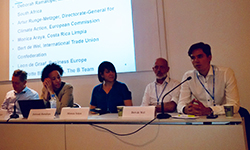 “The yellow vest movement and the student protests are clear examples that Europe’s governments and businesses need to engage more effectively with their citizens by involving them in the energy transition”, said BusinessEurope’s Environment and Climate Adviser Leon de Graaf at a panel on long-term climate strategies and how to get all of society involved. He made his remarks on 25 June during the annual technical climate change negotiations in Bonn, alongside panellists from the European Commission, national governments and civil society. De Graaf added that “effective policy on climate change is about investing in education and reskilling our workforce, it’s about creating public acceptance for the energy transition, keeping the electricity bill of households manageable, and making sure other economies become as ambitious as Europe”.
“The yellow vest movement and the student protests are clear examples that Europe’s governments and businesses need to engage more effectively with their citizens by involving them in the energy transition”, said BusinessEurope’s Environment and Climate Adviser Leon de Graaf at a panel on long-term climate strategies and how to get all of society involved. He made his remarks on 25 June during the annual technical climate change negotiations in Bonn, alongside panellists from the European Commission, national governments and civil society. De Graaf added that “effective policy on climate change is about investing in education and reskilling our workforce, it’s about creating public acceptance for the energy transition, keeping the electricity bill of households manageable, and making sure other economies become as ambitious as Europe”.
Contact: Leon de Graaf
Calendar
- 28-29 June: G20 Summit in Japan
- 30 June: EU Summit
- 1 July: Finnish Presidency of the Council of the EU
- 3-5 July: B7 Summit
- 8 July: BusinessEurope event A trade strategy fit for the 21st century
Reminder: please have a look at our privacy policy